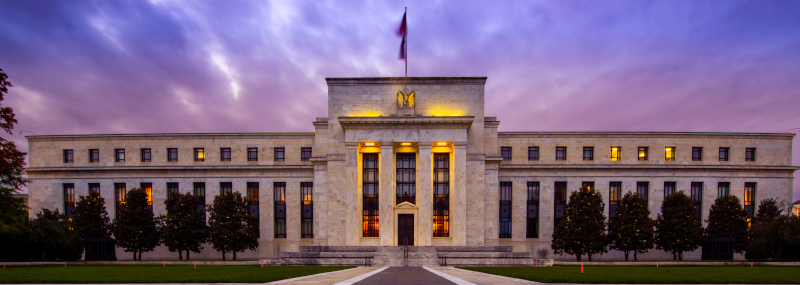One of the biggest influences on the US banking system, the financial sector, and even the economy as a whole is the Federal Reserve. Read on to learn more about what the Federal Reserve does and how it can affect the economy and your money.
What is the Federal Reserve?
The Federal Reserve, nicknamed the Fed, is the central bank of the United States. Although the Fed is headquartered in Washington, DC, it has 12 regional banks located throughout the US in cities like Boston, Minneapolis, and San Francisco.
What does the Federal Reserve do?
Congress created the Federal Reserve in 1913 to help promote a more stable financial and monetary system. The Fed also acts in a regulatory role, ensuring that banks are following financial laws and protecting consumer rights.
The Fed uses several tools that work together to accomplish its goals.
1. Traditional tools: Controlling the money supply and adjusting the cost of borrowing (interest rates) via the federal funds rate
The Fed can create more dollars within the economy or take them away. One way is by changing the rules for how much money banks must keep in cash reserves versus lend out to consumers. The greater the money supply, the more people can borrow, spend, and invest. That can benefit the job market because the uptick in buying means companies can afford to hire more people. While this can stimulate economic growth, it can also lead to inflation. If the Fed needs to cool off a too-hot economy and curb inflation, it can restrict the money supply.
Then there’s the federal funds rate (FFR), a range set by the Fed that dictates how much it costs banks and other financial institutions to borrow money from each other overnight to meet on-hand cash requirements. That’s a technical definition with real-world consequences for regular consumers. When it costs more (or less) for banks to do business, it can influence what they charge their customers to do business.
2. Unconventional tools: Quantitative easing
In response to the extreme financial conditions during the 2008 global financial crisis and, more recently, the March 2020 pandemic outbreak, the Fed turned to extraordinary measures. This included buying large quantities of securities, such as government bonds, from the public market. This was intended to bolster the financial system in a way that lowers borrowing costs and stabilizes long-term interest rates.
How could the Federal Reserve impact you?
A Fed policy change related to interest rates—or even rumors of it—can have a ripple effect on your personal finances, especially if you have variable-rate debt or plan to take out a new loan.
While the fed funds rate doesn’t directly change interest rates on forms of consumer debt, such as mortgages, car loans, and credit cards, it's a benchmark for these lending products. For example, credit card rates are tied to the prime rate, which is influenced by the Fed funds rate. Because larger loans, such as mortgages, are typically paid back over many years, even a small difference in your interest rate can cost you a lot.
If you have an existing fixed-rate mortgage, your interest rate won't change. But if you're planning to buy a home when interest rates are on the rise, you can expect higher monthly payments. And while your credit card balance probably isn’t as big as a mortgage, consider paying off any of that debt as quickly as possible when rates are rising. Many credit cards come with double-digit variable interest rates, and you could see your interest rate spike after a Fed rate hike.
Some good news for savers: The federal funds rate is also indirectly tied to what banks pay you to keep money in savings accounts or a money market fund. The higher the interest rate, the more you may earn on your savings or cash investments.
Fed moves can affect your investments too. Investors tend to react to headlines about whether the Federal Open Market Committee (FOMC) is likely to increase or decrease interest rates at their next meeting.
FAQs about the Fed
Who owns the Federal Reserve?
Nobody owns the Federal Reserve, and it is not part of the US federal government. The Fed works as an independent organization with the purpose of serving the public.
Who runs the Federal Reserve?
The Board of Governors heads up the Fed from Washington, DC. That group includes 7 members, all appointed by the president and confirmed by the Senate. A chair and vice chair serve as the board’s leaders for a renewable term of 4 years.
How many Federal Reserve Banks are there?
Within the broader Fed system, there are 12 regional banks in major US cities including Atlanta, New York, and St. Louis. Each regional bank oversees a district of states (some even include US territories), and these banks help gather economic information from around the country.
Who is the chairman of the Federal Reserve?
The current Fed boss, Jerome “Jay” Powell, has been in his role since 2018 and was preceded by Janet Yellen, who went on to serve as President Biden's secretary of the treasury. Powell's term as Fed chairman will end in May 2026, though his term as a Board of Governors member doesn't expire until January 2028.
What is the Federal Open Market Committee (FOMC)?
The Federal Open Market Committee (FOMC) is a key group which includes the Board of Governors and 5 regional bank presidents. They control the country’s monetary policy. The FOMC meets 8 times a year and is tasked with a dual mandate of maximizing employment and stabilizing prices (as in keeping inflation in check).
When is the next FOMC meeting?
FOMC meetings are heavily anticipated events, as policy decisions can have a big impact on the economy. You can find the schedule of FOMC meetings and read FOMC meeting minutes here.


